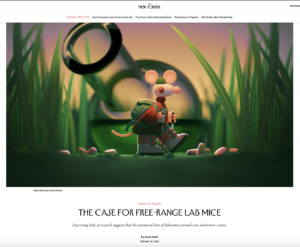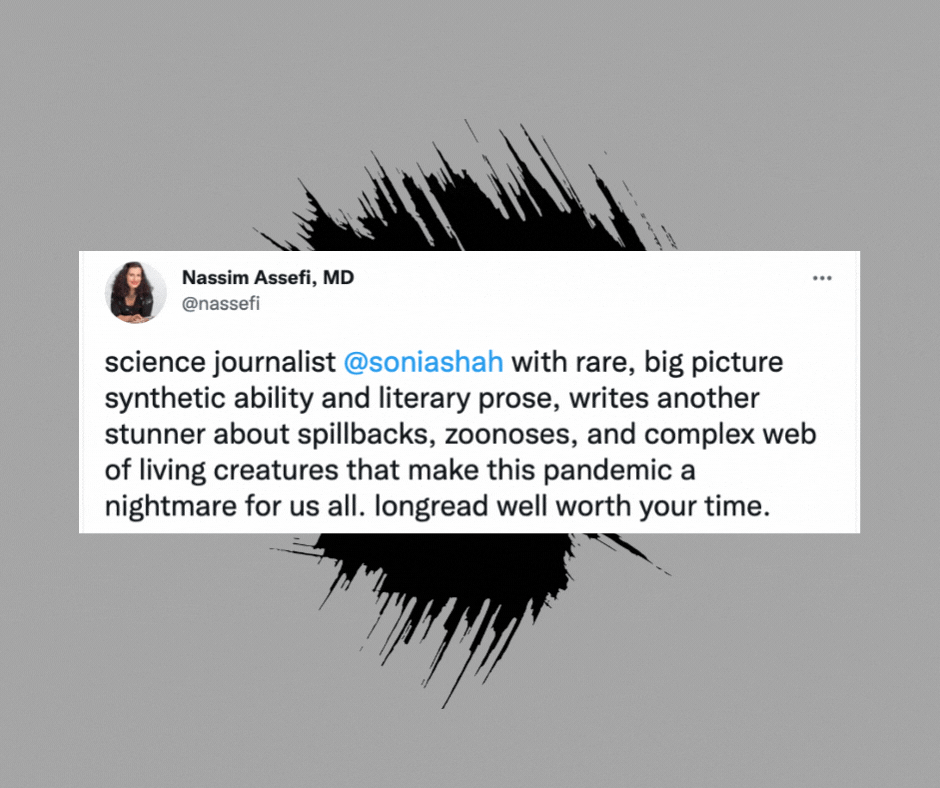Late last month, a small notice in the Federal Register announced that after more than thirty years, the FDA will summarily excise the World Medical Association’s “Declaration of Helsinki,” the internationally recognized gold-standard for principles of ethical medical research, from its codes. It’s a shocking departure, and one that has hardly made a dent in the mainstream media. Here’s a guest blog I wrote about it for the national consumer rights group Prescription Access Litigation:
Category: Science and Politics (Page 3 of 4)
Well, kind of. The OHRP shot out an email responding to Gawande this week. They say that the “program” was actually a research study,the results of which were published in the NEJM. That is, the peoplewho impemented the intervention didn’t actually know whether it wouldwork or not. Maybe the patient would start seizing on the table whileall the staff were huddled over the checklist, ticking boxes. Whoknows? With that kind of uncertainty, surely patients had a right to beinformed and consenting. And yet, the researchers had gotten no ethicscommittee review (IRB) or their subject’s informed consent.
But that wasn’t quite it, either. The “study” had no control group,because nobody wanted to NOT use the checklists. In other words, theerstwhile researchers felt they knew that it WOULD work. In which case,they were simply trying to improve patient care with a provenintervention and no IRB or informed consent was required.
So was it really a “study” or was it actually a “program”? Did they know it would work or didn’t they? How confused were they?
Well, in the actual doing of the thing, the clinicians conductedthemselves as if it were a program of improved care, but then when theywrote up their results in the NEJM, they cast their work as anexperimental ‘study.’
That’s not right, either: you can’t have it both ways. Someonecomplained to the OHRP, which opened some kind of investigation, whichthen led to Gawande’s complaint, and a flood of angry letters to theOHRP. Phew!
All of which is to say: there’s a shifting line between what we say weknow and what we say we need more research on. When there’s somethingwe want to do, when there’s political will and money to do it, wedispense with “research” quickly and move on to implementation. Inother areas–say, the administration of expensive drugs to poorpeople–there are endless calls for studies and experiments to provethe same thing over and over again, putting subjects at some risk everytime, because intransigent authorities (drug companies, healthministries) find it politically more expedient to say “we need moreresearch” instead of “sorry, no” (or “absolutely not, who cares aboutpoor people who don’t buy lots of stuff.”)
Fyi, these were the checklisted items, as reported in the NEJM, used inthe ICU on patients with catheters: hand washing, using full-barrierprecautions during the insertion of central venous catheters, cleaning the skin with chlorhexidine, avoiding the femoral site if possible, andremoving unnecessary catheters. The implementation of these procedurescoincided with a precipitous drop in the number of catheter-relatedinfections, but without the control group, no cause and effect can bedetermined, at least not by this study.
Inhaled insulin: Here’s a great illustration of how disconnected the drug industry has become from public health….or even individual peoples’ health. When I went to a industry conference a few years back, Pfizer execs were gloating over their great new experimental product, a form of inhaled insulin. The drug was still in clinical trials–meaning they couldn’t have known whether it was truly safe and effective or whether it was any better than injected insulin–but they were certain that it would be a blockbuster. Because, of course, whether the drug was effective or any better than what we already have was irrelevant. Inhaled insulin is a great idea, in principle, and the obvious plan was to harangue patients with marketing so they’d switch to it on that basis alone.
Well, Pfizer’s drug, Exubera, was a bust. They “only” sold $12 million worth of it, and so now they are going to stop selling it! First it was the best thing since sliced bread, but now…since they aren’t making the billions they foresaw, they’re dumping it. So much for those users who did switch and actually liked it. They’re screwed.
Basically, the drug was a bust because it was no better than injected insulin and on top of that, it messed up patients’ lungs. A total disaster.
Now, a new company called Mannkind, backed by a billionaire investor, is launching a new inhaled insulin called Technosphere Insulin, similarly gloating–while the drug is still in clinical trials–that they will make billions on the thing. The New York Times business section featured their glossy PR in an article this morning, replete with a large pic of the billionaire investor looking smug in his grand digs. He might as well have had dollar signs tattooed on his eyeballs.
Buried near the end of the story we learn that–already!–more patients taking the inhaled insulin have dropped out of clinical trials than patients taking the old standby, injected insulin! “For reasons that are not yet clear”! Well, there can’t be any reason, in my mind, that doesn’t bode poorly for the inhaled insulin. They didn’t like it, they had adverse effects, or whatever.
And, the chief medical officer has accused the company of hiding information about the drug from the FDA! The company, in response, fired him. But we’ll never learn about the dirt he found because his wrongful termination suit has been settled out of court!
This thing seriously stinks. And it is all the more remarkable for the fact that all of this dirty laundry about the drug is tucked into what is overall a glowing business story.
Check it out: http://www.nytimes.com/2007/11/16/business/16mannkind.html?_r=1&oref=slogin
Will the Nigerian charges against Pfizer change how drug companies conduct clinical trials in developing countries? I don’t think so. The Nigerian authorities seem to be more interested in sensationalizing the charges and catering to their own disgruntled populace. (And can we really expect the Nigerian government and an American company to come clean about what happened during that mengingitis epidemic in 1996? Evidence suggests that the Nigerian authorities were complicit in some way, just as they’ve been complicit for decades in Western oil companies’ exploitation of their citizenry in the Niger delta.)
What’s really needed is greater transparency, but the Nigerian authorities are not asking for that. They’re asking for payback. The bad PR that Pfizer will inevitably get may very well make drug companies more secretive about their activities in poor countries–which will make clinical trials more dangerous for trial subjects everywhere.
Nigerian authorities have threatened to send Interpol to capture Pfizer staffers, after the nine Pfizer employees brought up on criminal charges in Nigeria failed to show up in court on Wednesday, after being served not just one but two summons.
“If they fail to appear in court” on November 6, the judge said, “we will have no option but to seek the help of Interpol in arresting them and bringing them to court.”
One suspects this is a ruse to appease a restive public–protests against Pfizer were in the works–while pumping up pressure to extract big dollars in a settlement. Out-of court talks to settle the case started in September, and are scheduled to resume on November 17…after the Pfizer folks stand trial.
The federal lawsuit against Pfizer was also adjourned, to October 22; and a final civil lawsuit was adjourned to December 5.
Stay tuned for more…
Nigerian authorities slapped criminal charges on Pfizer this month, alleging that the company’s infamous 1996 botched antibiotic trial there was “rash and negligent,” and endangered lives.
Some of the subjects in the trial died, others suffered permanent disability, and the prosecutors say it’s Pfizer’s fault for providing a too-low dose of its comparator drug. (Listen to stories on NPR and ABC Australia, which feature a few quotes from me, for details.)
That’s a medical question on which the experts are not unanimous. Kids die from meningitis and are permanently disabled by it, too.
Less debatable is the fact that Pfizer violated international ethics standards and their subjects’ human rights. In a separate class-action suit against the company, the subjects said that they didn’t know they were in an experiment, and the company did not produce signed informed consent forms. The ethics committee “approval” the company produced later turned out to have been backdated.
This is the first time a state has filed criminal charges against a drug company, but I doubt it will be the last. With 80 percent of clinical trials failing to meet recruitment deadlines in the West, major drug companies are today conducting half or more of their trials outside the major markets, often in countries–like Nigeria–with poor human rights records and weak regulatory infrastructures. Pfizer’s Nigeria trial is unusually sensational and high profile, but its bending of the rules may be more the rule than the exception.
No sympathy from Tauzin—a cancer survivor himself—for those sickly elders compelled to hobble onto buses to Canada to buy affordable medicines, either: according to Tauzin, these unfortunates are no better than Al-Quaeda conspirators “opening our borders…to future terrorist attacks.” (And for those concerned about the potential for abuse in tens of thousands of secretive clinical trials conducted on the untreated poor of the world, Tauzin points to PhRMA’s toothless “principles” on ethical research as indicative of the industry’s “more responsible role” in “clinical trial transparency and openness.”
As another legislator-turned-lobbyist J. Bennett Johnston observed, “everybody should have a job where they use the knowledge, talents and skills they have.”Quite. Nexium, anyone?
Important bans protecting prisoners from medical experimentation are on the verge of dissolution.
As reported by the New York Times today in a front-page story, last month the Institute of Medicine recommended that federal agencies drop the bans. The bans, long justified by the fact that people behind bars can scarcely be viewed as voluntarily consensual, stanched a once-booming industry of experimenting on the incarcerated. Drug companies disassembled the testing labs they’d built next to the prison gates.
If lawmakers take up the IOM’s recommendations as expected, the floodgates may once again be opened.
The IOM takes pains to detail researchers’ transgressions against prisoners in scientific experiments–see this NYT video on the Holmesburg trials, for example–but considered that the hypothetical benefits of prisoner research outweigh the certain and well-documented risks.
These lauded benefits, unlike clearly detailed risks, sound wonderful but are curiously vague.
More details to come…For now, chew on the fact that many of the authors of the IOM recommendations conduct prisoner research (to answer various social science and epidemiological questions) themselves. A conflict of interest, perhaps?
Last week’s front-page Washington Poststory detailing a long-suppressed Nigerian government report on Pfizer’s botched 1996 experiment on Nigerian children shines much needed light on a dark corner of globalization: the drug industry’s human experiments overseas. But those who are now calling for stricter regulations on the practice aren’t goingnearly far enough.
According to the May 7 Washington Post, California Rep. Tom Lantos plans to introduce a bill that would require U.S. investigators to detail their planned trials in developing countries to federal regulators. Right now, researchers must provide regulators with such details only if they plan to enroll American patients into their trials.
It’s an important provision, especially considering that most trials render negative results—a drug doesn’twork, or doesn’t work well enough, for examples. Industry scientists rarely trumpet such failed trials in medical journals, advertisements, and the like, so unless there’s some external record of the trial, those experiments just fade into oblivion. That’s especially troubling in the case of trials conducted in poor countries, because many are for drugs that are rarely accessible to the patients who filled the test clinics in the first place. Worse, if something goes awry in such trials—for example, if the drug is revealed as dangerous, or if subjects are unduly harmed, or uninformed—it is unlikely anyone will ever know about it.
Lantos isn’t the only one calling for more early details on such trials. In September 2004, the International Committee of Medical Journal Editors, fed up with drug companies’ selectively publishing only the good news about their products without the bad, announced that they’d only consider publishing those trials registered at inception on a publicly available database, such as the NIH’s ClinicalTrials.gov. The WHO plans to finalize another such effort on May 20, which they are dubbing “international clinical trials day.”
It would be hugely helpful for scientists, patients, regulators, ethicists and journalists to know in advance of the kinds of trials being conducted around the world. But is it enough? After all, hundreds of clinical trials, run by both drug companies and academic researchers, have been routinely listed on government and industry websites for years. Thousands are published each year in the medical literature. These include many condemned as unethical, such as experiments in which pregnant Ugandan women with HIV and malnourished Zambian children with AIDS, for examples, are given placebos rather than active treatments.
Some researchers have justified such experiments on the basis that impoverished, sickly patients in poor countries can’t afford anything better than a placebo anyway, a double-standard that a 2004 Journal of Medical Ethics paper defended as “not the optimal ethical standard…[but] at least not clearly unethical.” In such cases, trial details were readily available, described as ethically dubious, and sanctioned anyway. Clearly, just knowing about overseas trials is nowhere near sufficient to protecting the human rights and dignity of trial subjects abroad.
What we need even more urgently than greater oversight is greater restraint. Unless drugmakers are producing medicines that will be beneficial and accessible to patients in developing countries, let them stay home for their experimentation. After all, what poor, sick patients in developing countries need more of is medical care, not medical experimentation.
Until the benefits of the last hundred years of medical research are readily available in poor countries, why not require that those who benefit from new drugs—the major drug consumers in the United States, Europe, and Japan—shoulder the burden of experimentation that new drug development requires?
Something went horribly wrong in an early experimental trial of a German start-up drug company’s new cancer-and-arthritis med. Sometime last week, the drug—TGN 1412—was given to 6 healthy volunteers in a routine Phase 1 trial, designed to test the drug’s safety. Today, all six of those volunteers are laid up in intensive care wards in Britain, fighting for their lives.
The volunteers “experienced adverse events,” the company stated in its press release. I’ll say. One young man’s head and neck ballooned to three times the normal size. The others suffered multiple organ failure. See the BBC story here.
Here’s how big the drug business is. This company has no drugs in its portfolio. A former Roche exec launched the company, TeGenero, specifically to develop TGN-1412 (and, presumably, other drugs like it.) They got drug giant Boehringer Ingelheim on board to manufacture their as-yet-undeveloped drug. They got the European drug authorities to bestow their unborn med with “orphan” drug status (because along with cancer and arthritis, the drug might also be used for rare diseases.) They raised no less than 14 million Euros…and all this with no proven-effective drug in hand. Until nearly killing some volunteers this week, all the drug had been proven to do was help some artificially sickened rats.
One can only imagine the financial and scientific pressure on the first human test of the drug. On the other side of the test bed, the usual cohort of cavalier and cash-starved students would have lined up. For these kinds of tests, it is students and homeless people who generally bear the burden of risk. Drug companies purposely set up their early testing centers near universities to entice them. Do they understand the risks involved? Who knows? At a payrate of around $100 to $200 a day, including room and board, “it’s money fordoing almost nothing,” as a trial volunteer once explained to me.
Never mind that early trials are, arguably, the mostdangerous of all experimental drug trials. Toxic reactions occur in about 40 percent of all Phase One trials. And as we can see from this botched experiment, sometimes those toxic reactions are a whole lot worse than a minor skin rash.
This time news leaked out. But generally, the public never hears anything about failed early drugs. The experimental drug poisons a few test subjects and is quietly dropped from development, with nary a drop of ink about it, just one in a line of failed drugs lying in the wake of each and every blockbuster. We await the results of the investigation, now ongoing.













